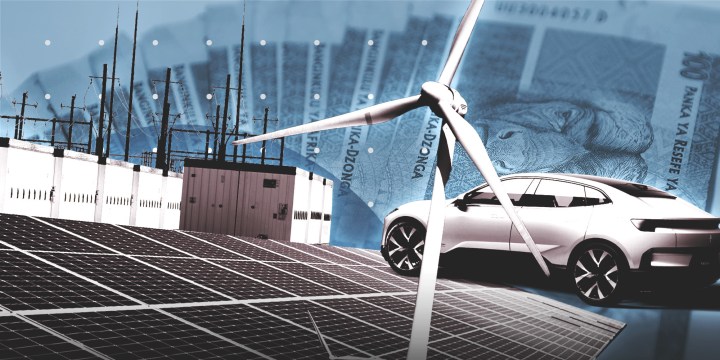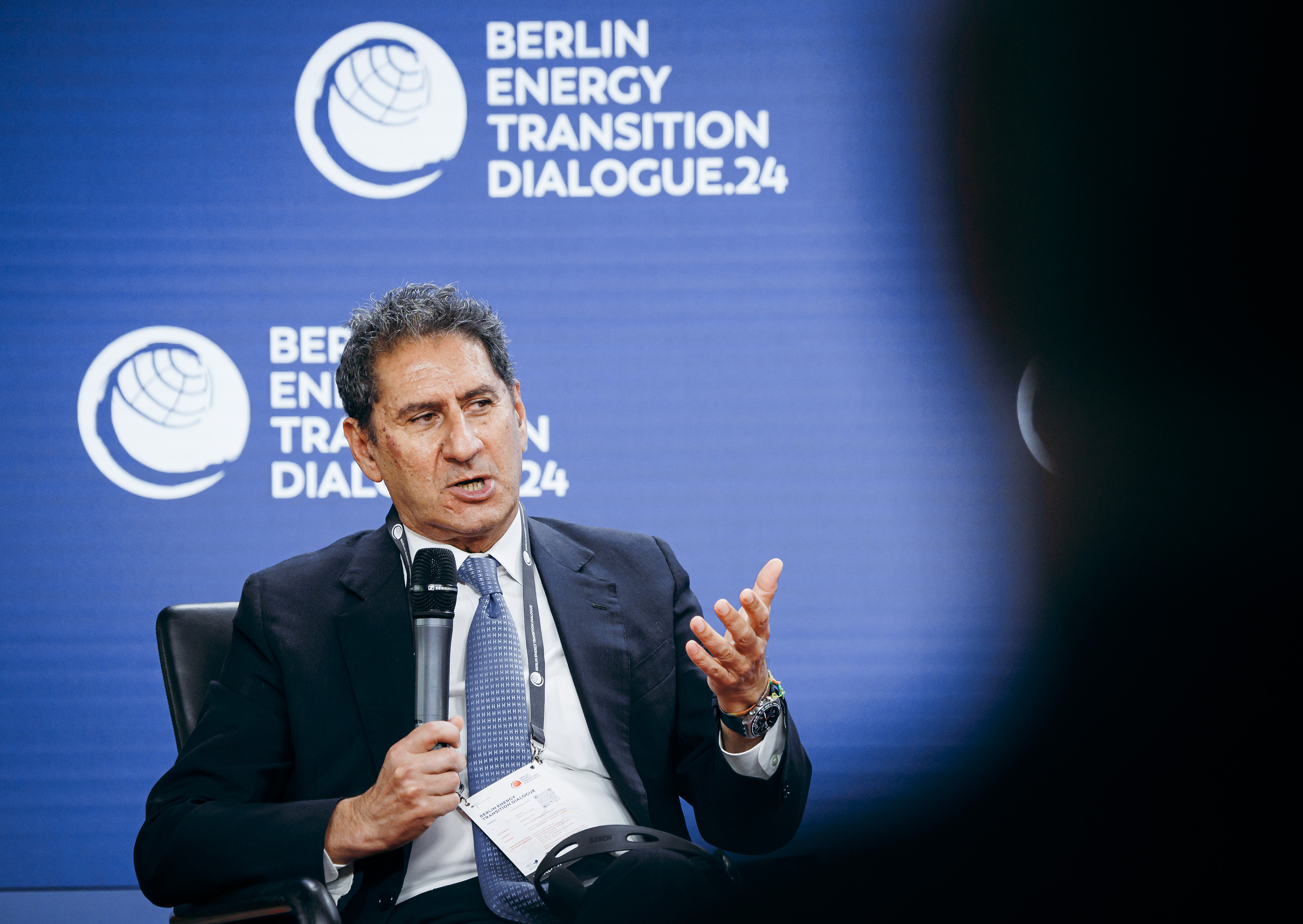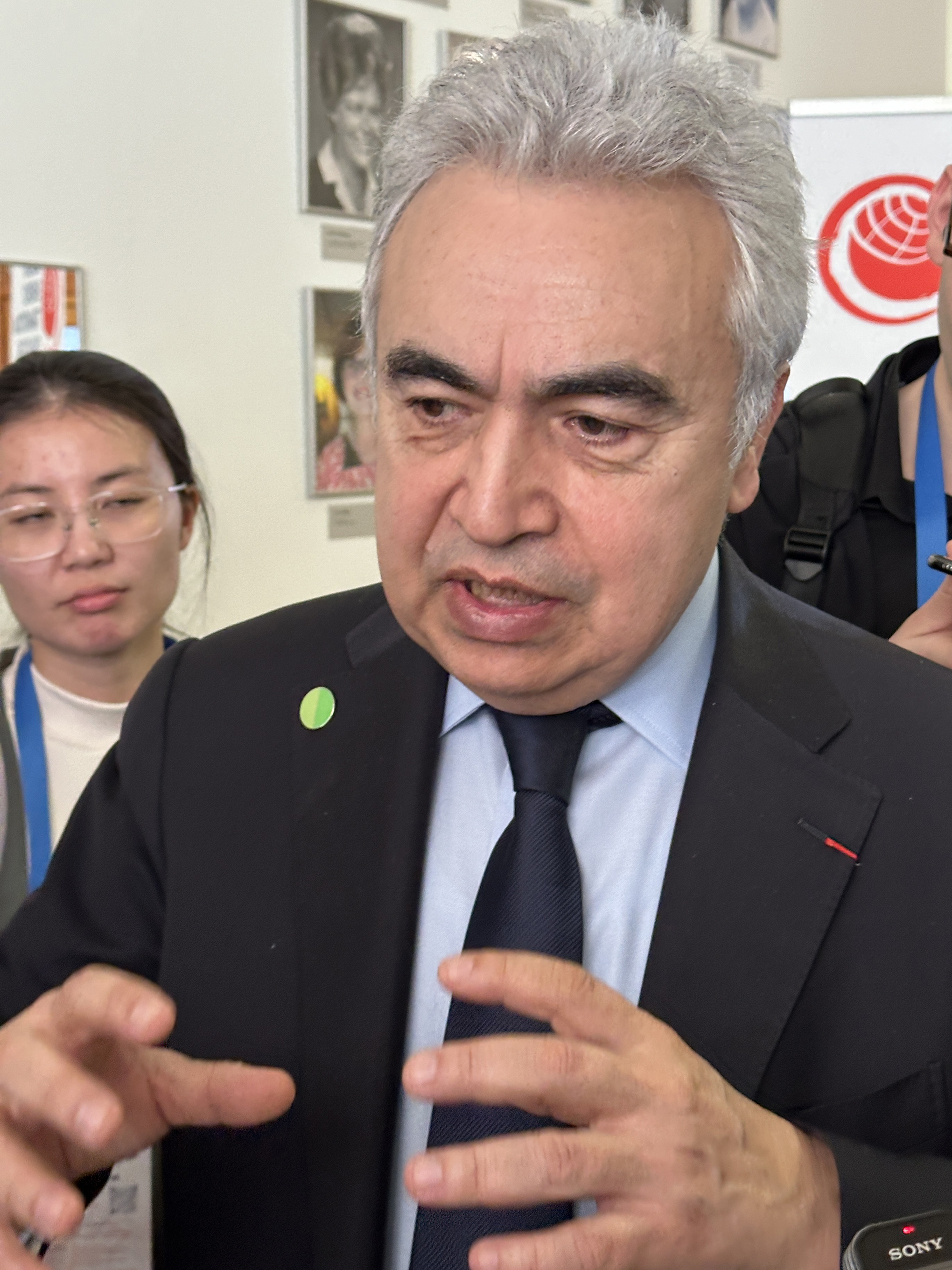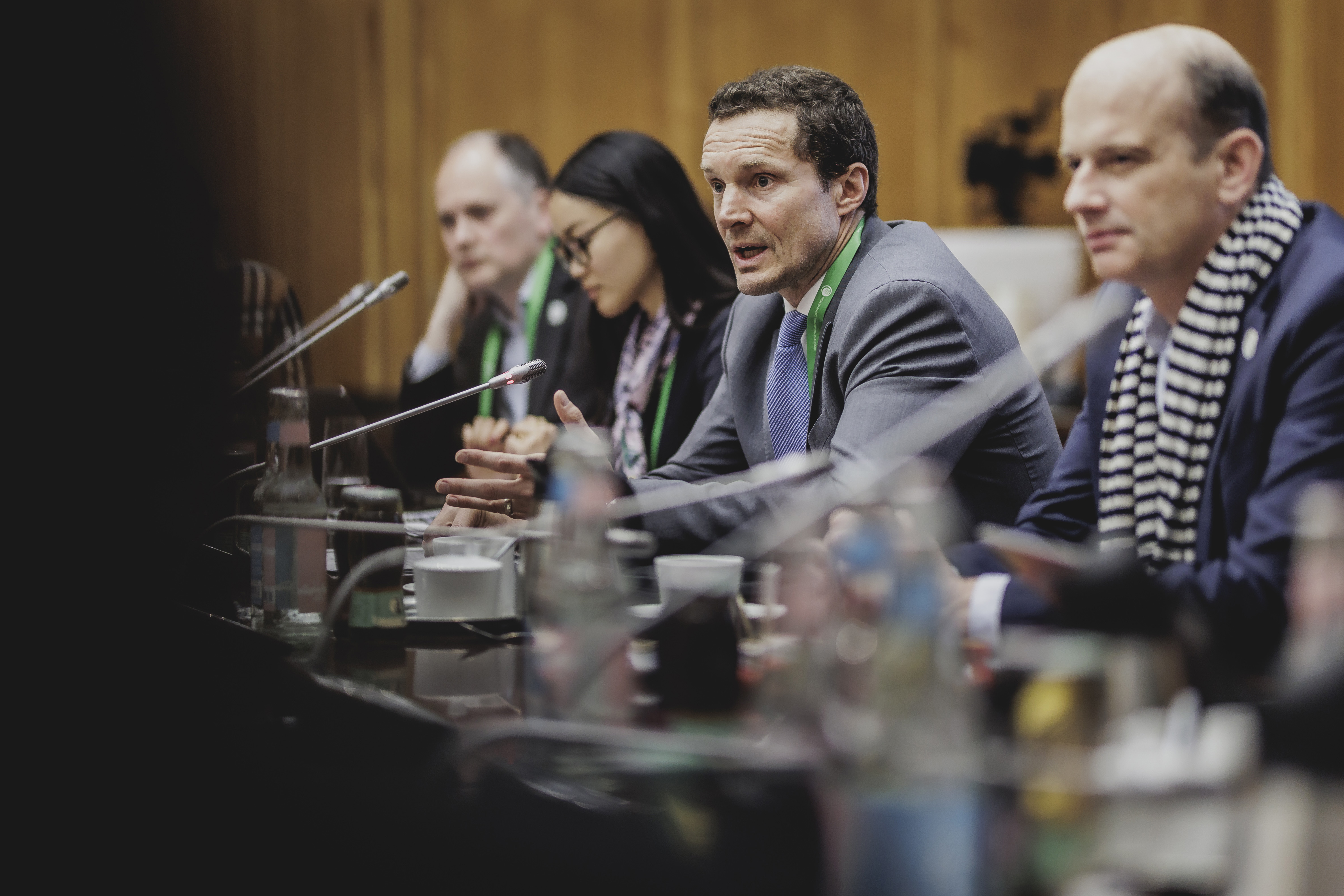TRANSITION STRATEGY
Renewables the only energy solution that can avert climate disaster, conference told

While South Africa looks to develop new nuclear energy capacity, the arguments for such energy are weak as much of the world moves towards emission-free renewable energy technologies.
While it is the sovereign right and prerogative of nations to choose their energy mix, the arguments for adding new nuclear capacity are weak, according to the director-general of the International Renewable Energy Agency (Irena), Francesco la Camera.
Irena is an intergovernmental organisation supporting countries in their transition to sustainable energy and La Camera played a key role in bringing together multilateral organisations to develop joint initiatives designed to implement the Paris Agreement and the Sustainable Development Goals.

Francesco La Camera, director-general of the International Renewable Energy Agency, addresses the opening panel of the 2024 Berlin Energy Transition Dialogue. (Photo: Florian Gaertner / photothek.de)
Speaking at the opening of the 10th Berlin Energy Transition Dialogue last Tuesday, La Camera said, “We need rapid systemic change.”
He said the 473 gigawatts (GW) of renewable energy capacity added globally in 2023 was laudable — especially considering it was almost double the capacity added the previous year — but it was not enough in the face of a world edging ever closer to the thresholds that define dangerous climate change.
According to Irena’s most recent report, Tracking COP28 outcomes: Tripling renewable power capacity by 2030, the world needs to add more than double the amount of renewable energy capacity that it did last year, which amounts to a whopping 1,000GW or one terrawatt (TW). One TW is one million megawatts (MW) or, in South African terms, one million stages of load shedding.
Asked about the role of nuclear energy in the transition from high-carbon to low-carbon economies, La Camera put things in context. Eliciting laughs from the crowd after a journalist asked a question about nuclear energy, he asked rhetorically, “You have a good internet connection?” and urged attendees to google how much installed nuclear capacity currently exists.
According to the International Energy Agency (IEA), by the end of 2022, 414GW of installed nuclear capacity had been brought online worldwide since the 1950s. His point, La Camera explained, was that in just 2023, more emission-free renewable energy technologies had been installed globally than the combined total of more than 70 years of nuclear technology.
“Why do I use this example?” La Camera asked rhetorically. “There is this concept of the neutrality of technology.”
He described it as being “false”, saying that “the only technology that provides what is needed in terms of clean energy by the 2030s is renewables.
“It’s not just wind and solar. It’s storage. It’s the only way if we want to keep this 1.5 [degree Celsius global average temperature increase] promise alive.”
In the context of a planet edging ever closer to surpassing the 1.5°C target of the Paris Agreement, the speed of deployment and pace at which the countries of the world can mitigate their emissions and transition to emission-free sources of electricity generation are crucial.
Read more in Daily Maverick: AR6 synthesis report: Warming above 1.5℃ is likely in the near term unless the world acts now, says the UN
Speaking to journalists on the sidelines of the Berlin Energy Transition Dialogue, Dr Fatih Birol, the executive director of the IEA, shared a similar outlook on renewable energy.
“This is about acceleration. Energy transition is moving very fast in the manner of advanced economics, in Europe, in North America, Japan … and China is by far the leader. China is today the champion of clean energy transition around the world,” he said.

Dr Fatih Birol, executive director of the International Energy Agency, answers questions from journalists on the sidelines of the Berlin Energy Transition Dialogue. (Photo: Ethan van Diemen)
“So the problem is how we are going to accelerate the clean energy transition in the developing world.”
SA’s nuclear energy plans
The sentiments of the Irena boss echo concerns about nuclear energy that are particularly relevant in the South African context. Earlier this month, the Southern African Faith Communities’ Environment Institute (SAFCEI) and Earthlife Africa Johannesburg announced that they were deciding whether to launch legal action over the government’s plans to develop new nuclear energy capacity in the country.
Daily Maverick reported that in December 2023, Electricity Minister Kgosientsho Ramokgopa announced that all the “suspensive conditions” to procure 2,500MW of new nuclear power had been satisfied.
Read more in Daily Maverick: Questions raised after Ramokgopa starts procurement process for 2,500MW of nuclear power
That announcement, in line with the government’s now outdated Integrated Resource Plan (IRP) 2019, envisaged 2,500MW of nuclear power by 2030.
Zizamele Mbambo, the deputy director-general for nuclear energy in the Department of Mineral Resources and Energy (DMRE), said at the time of the announcement that the first unit would be commissioned between 2032 and 2033. For context, the Koeberg power station took nine years from the start of construction to its full synchronisation with the grid and has an installed capacity of 1,860MW.

Members of the Global Renewables Alliance address the media at the 2024 Berlin Energy Transition Dialogue. (Photo: Florian Gaertner/ photothek.de)
Francesca de Gasparis, the executive director at SAFCEI, said earlier this month that they were “considering taking the 2,500MW nuclear determination on judicial review because we believe that the public consultation process, conducted by the National Energy Regulator of South Africa (Nersa), was flawed and procedurally unfair”.
The determination, the groups argue, could eventually see as much as 21,000MW of new nuclear electricity generation capacity being procured and constructed by 2050 in line with the Horizon 2 period (2031 to 2050) of the draft IRP 2023. That draft plan says that “the analysis of this pathway yielded a total capacity of 4,000MW of new nuclear by 2040 with additional nuclear capacity up to 14,500MW by 2050.”
Read more in Daily Maverick: Government forges ahead with plan to procure new nuclear power
Daily Maverick has reported that nuclear energy has a chequered past in South Africa, marred by alleged corruption.
Under the Jacob Zuma administration, the government attempted to run a “closed tender process” for the procurement of nuclear energy. This was engineered to create a secretive and exclusive arrangement with the Russian state-owned nuclear power company Rosatom. The government’s agreement with Rosatom was set aside by a court after environmentalists launched a legal challenge against it.
“We find it curious that, in December 2023, the electricity minister announced that the DMRE had made a submission to Nersa in July 2023, outlining how it had gone about meeting the suspensive conditions, and that Nersa had considered these submissions ‘before concurring with the determination’,” De Gasparis said.
“And with reports that the DMRE plans to issue an RFP [request for proposal] by this month [March], our concern is that the public has not been afforded an opportunity to make representations on any evidence submitted by the energy minister to satisfy these suspensive conditions. The consideration of such representations should have formed a critical part of the decision-making process.”
‘Worrying’
Makoma Lekala, one of the two activists who launched the legal challenge that scuppered the Russian nuclear deal, said, “This is quite worrying because once again government seems to be bypassing the public’s right to provide informed input, especially when considering the exorbitant financing and construction costs associated with new nuclear power stations and the effect it could have on the cost of electricity (and disadvantaged electricity users in particular).
“It is important that South Africans are aware that large nuclear reactor projects are expensive to build and finance, and typically suffer from significant construction delays, which inevitably increases costs.
“And, while there are arguments that smaller reactors are the way to go, it is also important to note that no viable small modular reactor (SMR) options will be ready for commercialisation by 2030. And then there is the unresolved issue of radioactive waste disposal, which no one wants to talk about, but which continues to grow on-site at Koeberg and at the dump site in Vaalputs, in the Northern Cape.
“We must consider the overall affordability and feasibility of nuclear energy, especially when compared to other, more cost-effective and sustainable energy solutions. This is why we continue to emphasise the need for transparency and accountability in the country’s energy decisions.” DM
Disclosure: Ethan van Diemen is in Berlin, Germany, as a Berlin Energy Transition Media Fellow.






















 Become an Insider
Become an Insider
While it’s true that nuclear energy has been a significant contributor to power generation, particularly in countries like France, where it has demonstrated remarkable efficiency and reliability, it’s essential to consider the broader context. Nuclear energy undoubtedly has its merits, offering a stable and consistent power supply, which is especially crucial for developing countries seeking to meet growing energy demands. However, it’s also essential to acknowledge the associated challenges and risks, including concerns about safety, waste management, and cost.
Renewable energy technologies, such as wind and solar, have seen rapid advancements and cost reductions in recent years, making them increasingly competitive alternatives to traditional fossil fuels and nuclear power. Additionally, renewables offer inherent advantages such as scalability, decentralization, and environmental sustainability.
While nuclear energy may remain a viable option for some countries, it’s essential to pursue a diversified energy mix that leverages the strengths of various technologies while mitigating their respective drawbacks. Ultimately, the choice of energy sources should be based on a careful assessment of each country’s unique circumstances, energy needs, and long-term sustainability goals.